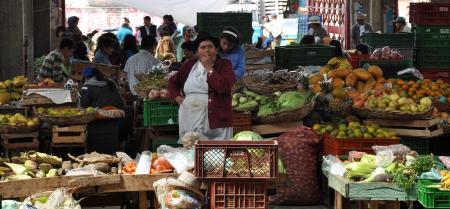 Farmer’s Market in Samaca, Colombia (Flickr: momentcaptured1)Over the last decade, several studies have warned that agricultural production is one of the most vulnerable sectors in the global economy, particularly for subsistence and small farmers, who are the main food producers in the world. Given the global hegemony of the neoliberal model and the dogmas of “free marketers,” the encroachment on the rural economy continues unabated. These warnings have fallen on deaf ears in most governments.
Farmer’s Market in Samaca, Colombia (Flickr: momentcaptured1)Over the last decade, several studies have warned that agricultural production is one of the most vulnerable sectors in the global economy, particularly for subsistence and small farmers, who are the main food producers in the world. Given the global hegemony of the neoliberal model and the dogmas of “free marketers,” the encroachment on the rural economy continues unabated. These warnings have fallen on deaf ears in most governments.
Now, with the rising specter of a global food crisis comes the eminent approval by the U.S. congress of the Free Trade Agreement (FTA) with Colombia, which will pose a serious threat to the peasant economy. The most important thing to note is that small and subsistence farmers in Colombia—in accordance with the global trend—produce 63% of the food that the country consumes (UNDP, Hechos del Callejon, 2008). This is while in Latin American subsistence farming is responsible for 41% of the agricultural output for domestic consumption, and 51% of the corn, 77% of the beans, and 61% of the potatoes for regional consumption.
These are very revealing figures that run against the common wisdom of the neoliberal orthodoxy that claims that efficiency and economies of scale require large capitalist mechanized farms to supplant the “inefficient” peasant economy. This is the time to critically assess these dogmas and devise new international policies to protect the small producers to avert a global food crisis. The FTA with Colombia is nothing more than the continuation of a policy that promises an economic disaster to food producers.

